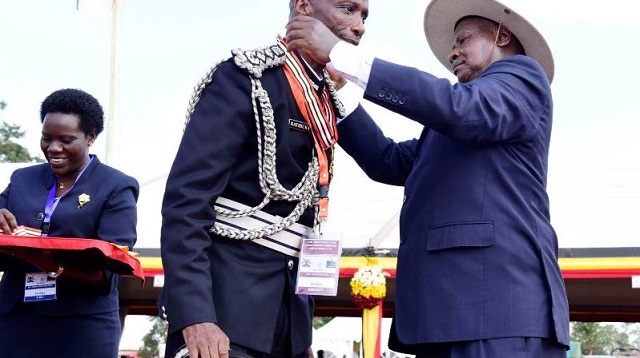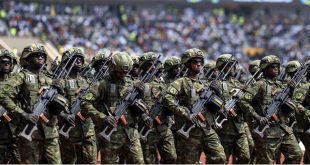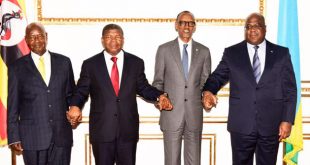
Bringing up the alleged kidnapping of Lt. Mutabazi is the clearest signal that these arrests were not just about crimes in Uganda and that Kayihura was in the crosshairs of the Uganda-Rwanda feud.
The incident happened in 2013 when Lt. Mutabazi was taken from Sky Hotel in Naalya, a Kampala suburb, where he was living with his family and repatriated to Rwanda where he was charged with terrorism and sentenced to life in prison.
But most importantly, Mutabazi’s case had played out in the media. Museveni knew about it and could have arrested those involved if he so wished. He did not. So why bring it up now?
Museveni’s handlers claim the President’s interest in the case was reignited when while in New York, U.S. for the United Nations General Assembly in September 2017. On the sidelines of the main event, a UN official reportedly complained to Museveni about the continued extradition of Rwandan refugees from Uganda.
But the GCM trial in Makindye, revealed something else. Apart from the police officers, the other two suspects were; a former Rwandan soldier, Rene Rutanungira, who has been living in Uganda and a Congolese national, BahatiMugenga.
That the operation to arrest the officers targeted people closest to Kayihura in the police force and was conducted by his foes from the CMI and ISO showed the depth of Kayihura’s trouble. The inclusion of the Rwandans also adds a tense diplomatic twist to the saga.
Kayihura’s powerful enemies
After the interrogation, Kayihura was taken to his home in Muyenga where his house was searched for four hours. Here he was allowed to see his family members, lawyers, and friends.
CMI’s Brig. Kandiho was part of the team that oversaw the search. The search team asked Kayihura for and carried away military equipment like radio calls, his phones, ipads and computers amongst other gadgets.
After this, the former police chief was driven back to Makindye where he is being held.
Makindye Military Barracks is the favoured detention facility for errant army generals. Maverick Gen. David Sejusa, also known as Tinyefuza was in 2016 arrested and detained at the facility on charges of planning election violence.
Kayihura lives under guard in a form of house arrest – as he is not in a cell. Instead, he is restricted in a tiny house with basic amenities including TV, phone, and hot water. His family can accesses him and deliver all his meals.
Kayihura saw some of this coming. For the last 13 years he was Police Chief, Gen. Kayihura, had managed to sell himself to President Museveni as the sole guarantor of his stay in power.
And for the most part, it worked. More than anything else, since he was appointed to head police in 2005, Kayihura fiercely infiltrated and crashed all political opposition against Museveni, and was critical to Museveni winning elections in 2006, 2011, and 2016—which happened while he was IGP.
In return, President Museveni put all resources at Kayihura’s disposal making him the most powerful general within government after the president himself.
When Kayihura was first appointed, the police budget was about Shs70 billion. But by the time he was fired on March 4, it had hit Shs500 billion. That is easily an over 700 % growth. At public functions, President Museveni openly praised Kayihura as a “good cadre”.
To get here, Kayihura had to expand the role of police from just keeping ordinary law and order to other aspects like intelligence, counterterrorism and even political mobilisation.
Getting into these areas meant eating into the budgets of other security agencies.
Indeed, as the police budget expanded, those of ISO and CMI shrunk earning Kayihura enemies in these agencies.
While Kayihura had managed to keep ahead of his enemies, things began getting out of hand in 2015.
Intelligence agencies blamed a surging crime wave on ragtag groups, including well known common criminals, under Kayihura’s protection. The reports started circulating that Kayihura had built a personal army of loyalists from the so-called crime preventers. Some people claimed they were as many as 11 million crime preventers who could be mobilised at short notice by Kayihura for political missions.
Amidst all these troubles, Kayihura also openly clashed with the President’s brother, the highly influential Gen. Caleb Akandwanaho aka Salim Saleh, who is seen as Museveni’s de facto number two. The dispute was over the fate of Christopher Aine, a security masquerader attached to former Prime Minister AmamaMbabazi’s presidential campaign in 2016.
At the height of the campaign, Aine disappeared after a punch-up with police at a rally and the Amama camp accused Kayihura of ‘disappearing’ him. Kayihura pleaded innocence, put Aine on the police wanted list, and even offered a Shs20 million bounty for information on his whereabouts.
But when Aine emerged in April 2016, he was under the protection of Gen. Saleh. Kiyihura tried to arrest Aine and failed, but not before Kayihura clashed publicly with Saleh.
Museveni did not respond directly by removing Kayihura. Instead, he built rings around him. Soon after the elections, in June 2016, he brought in Lt. Gen. Henry Tumukunde as minister for security. Tumukunde’s appointment was seen as calculated to counter Kayihura’s power. He also dispatched a team from Special Forces to camp at Police Headquarters in Naguru to study Kayihura’s power structure and report back.
 The Independent Uganda: You get the Truth we Pay the Price
The Independent Uganda: You get the Truth we Pay the Price


